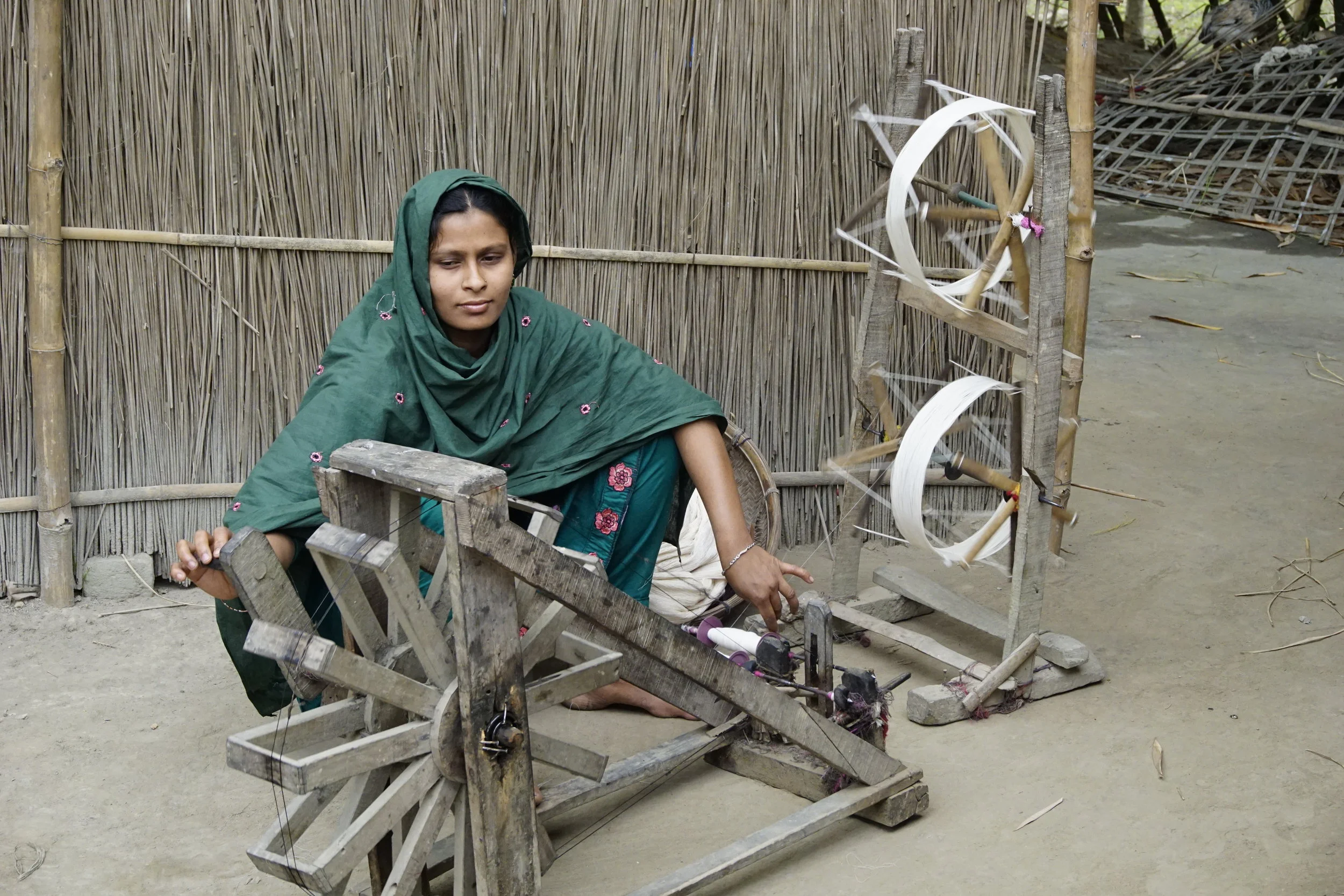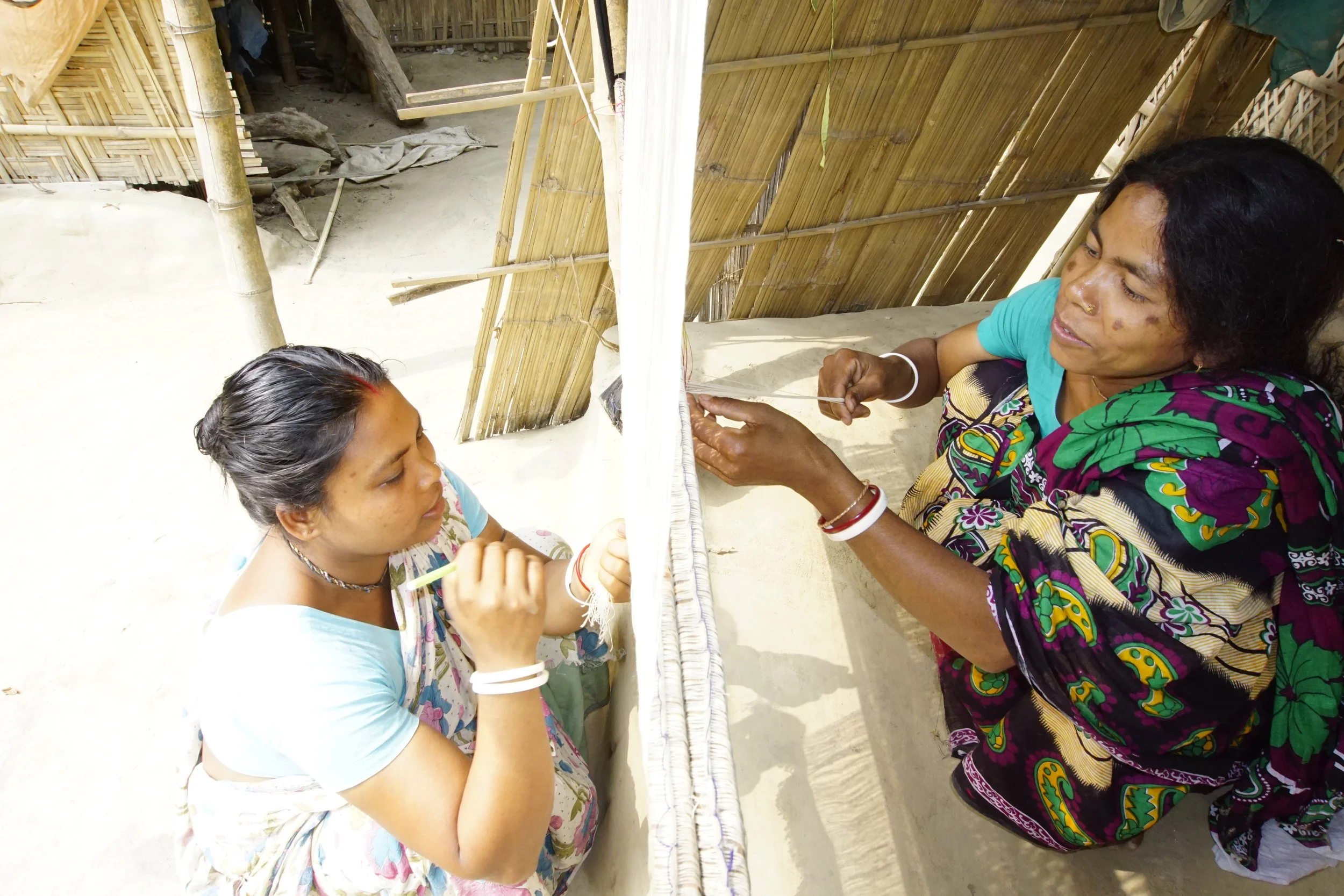World's First Ethically Produced Hand Painted Scarf Line
A new scarf brand is hitting the fashion market and it's the first of its kind! We spoke to Maisha Samiha, founder of Nokshi Crafts, who is launching her new collection of ethically produced scarfs that are hand-made works of art by women in rural Bangladesh. Committed to producing their own silk and then using a variety of design techniques such as hand dying, hand painting and batiking creates such an authentic platform for luxury products. In a place wherepoverty, diminished livelihood and unethical corruption is a societal norm, Samiha is planting trees where there's cracks in the cement. Giving these women a collaborative platform to excel while uplifting the beauty of their culture is beyond phenomenal.
Check out the interview we had with Maisha Samiha right before the launch of their Kickstarter and see why it's so important that we share this story!
Why did you start this brand and what does the name mean?
I was always fascinated by the art of hand painting and handmade goods. Growing up, my moms closet was filled with beautiful handmade garments with intricate patterns and designs and I knew from a very young age that I wanted to create a line of my own which would be unique, yet preserve the artisan traditions of Bangladesh. I completed my undergrad in 2013; around the same time the Rana Plaza disaster took place in Bangladesh, and that incident really struck a chord. All this time I used to go shopping and would get really excited to see a “made in Bangladesh” T-shirt or dress, but never did I think of those workers that were treated so poorly in the factories and many ultimately lost their lives. This is the dark reality of the retail manufacturing industry in Bangladesh. I created Nokshi Crafts with a desire to provide opportunities for workers whose voices are unheard and give them a platform to showcase their talent on a global scale without subjecting them to inhumane working conditions. Nokshi is derived from the Bengali word Noksha or Naksha, which means artistic patterns. It is mainly used to describe hand embroidery done by local women on recycled saris to turn them into quilts. In my current collection and also in my future collection, you will get to see tons of colours, patterns, and unique designs that will be all done by crafty artisans. So it seemed most appropriate to name my company Nokshi Crafts.
What has inspired you the most?
The potential of hand-made production is often overlooked due to the focus on fast fashion where unfair wages, adverse working conditions, environmental pollution, excessive use of water and creation of waste is often the consequence.
I took a trip to Bangladesh early this year and met up with a few artisans and producers. I learnt that many of these artisans couldn’t live off of only making handmade goods as they did not have the proper connections to markets, and they had no choice but forced to relocate and work in factories under inhumane conditions. My exposure to both contemporary production environments versus hand-made production environments was an eye-opener. As a Bangladeshi born Canadian, my expedition to rural communities in Bangladesh has inspired me to provide the solution to a problem while achieving my dream.
Why is it important to work with artisan women in Bangladesh?
Bangladesh has long struggled with poverty due to extremely high population density. Around 80% of the women in Bangladesh live in rural areas. In a country like Bangladesh, women’s influence on society often seems to be restricted to the boundaries of her home but a closer look, especially within the rural artisan communities, reveals they have multi-tier responsibilities and in some cases they are the head of household and are responsible for running the family. On the other hand, there are many women who have been subject to domestic violence, or is a survivor of a factory disaster, or even a victim of trafficking. I have thoroughly enjoyed exploring and watching artisans from all walks of life create handmade garments using centuries old techniques that are socially and environmentally sustainable. Through this journey, I was moved by the meticulous craftsmanship of these artisans in creating fine pieces of art. Having experienced this, my instinct was to empower these artisans to help them do what they do best, which would provide them with sustainable livelihoods.
How does the current climate of fast fashion and unethical practices affect the work that you’re doing? Does Rana Plaza and other factory disasters effect your brand identity either positively or negatively?
The Rana Plaza incident is a tragedy, one that is a product of process to manufacture fast fashion. This was one of many incidents that happen frequently, but the Rana Plaza incident really put a context to the complexity to the problem of fast fashion and social responsibility. The Rana Plaza incident is directly related to what I am doing – personally it has motivated me to find alternative approach to the problem and consequences of fast fashion from a different angle. More importantly, the Rana Plaza incident sheds light on working conditions and social safety net for these workers who are subject to adverse working conditions. As tragic as it is, incidents like these spark the right conversations and questions the status quo. My goal is to show the world that an alternative production environment that is socially and environmentally sustainable is within reach. Ultimately, through my business, I want to provide the opportunity for responsible consumers to make the right decision. Alternatives need to be shown and promoted to not only empower artisans but also empower consumers to create a shift in market trends towards some positive change.
How are your scarves made?
To ensure premium quality, we produce our own silk. Our scarves are made from Rajshahi Silk, a pride of Bangladesh – known for its soft buttery feel and durability. Silk farmers harvest small batches of mulberry leaves, which are fed to the domesticated silkworms. Feeding mulberry leaves to the silkworms produce the finest quality silk. Once the worms form cocoons, the strands are then reeled to create silk thread. The thread is then woven into the finest silk garment.
Upon completion of the weaving process, the scarves are sent off to either be hand-dyed or hand-painted. For our Batik scarves, the artisans first create intricate pattern on wooden stamps and turn them into a template using wax. Once the wax dries, the scarves are dyed with eco-friendly vegetable dyes that are not harmful to the environment or the artisans using them.
The second line is the most exclusive and rare collection on the market. We are super excited to bring our hand-painted silk scarves. We’re very proud to produce the first collection of its kind. Each scarf is painted by artists individually from start to finish, providing a human touch that is exclusive and rare. Our talented artists are able to tell a story through this personal touch. Each of these scarves is a unique piece of art, and wearing them, absolutely elevates fashion.
How do you define luxury?
Luxury to me is a state of mind rather then something tangible. Luxury extends beyond ownership of an expensive item. There are many luxuries that can be added without any cost associated with it, something you feel good about. As far as ethical luxury goes, it has to be anything with an element of uniqueness and exclusivity with great social message supporting its mission. The very personal touch to each of our scarf is element of luxury.
Quality is also very important to me, I feel like now a days quality is heavily compromised and masked under a famous designer label or just by the greed for more revenue. I truly believe in the phrase “Quality over Quantity”. Fast fashion or disposable fashion does not appeal to me, I want to feel good about wearing a garment and full luxurious knowing that I have supported artisans livelihoods and created positive change through this process. The status quo about fashion is missing the story about people who are ultimately the most passionate about their craft – the artisans. Telling this story is ethical luxury to me.
How do you define sustainability?
In the context of producing fashion, sustainability is the key-missing piece. It is rare that you find a solution to something that solves a problem in all facets. Through ethical fashion, I can create positive social, economic and environmental change. This is sustainability to me. Empowering women and empowering artisans to support their families at the comfort of their own homes, getting paid fair wages, women being recognized as key part of the workforce through their contribution and efforts, and having regard for the health of environment for these artisans through our production process – all indicate trends are positive for the consumers and the artisans.
Sustainability is the art of finding ways to make positive change while reducing negative impact of society, economy and the environment.
Is your cultural background important to your brand? If so, how?
My cultural background is my identity and it reminds me of my social responsibility everyday. It has a huge impact on my brand and my message. Part of my onus to create change is very personal to me. I have experienced these social issues first hand, and it really puts things into context for me mentally. Things we take for granted in the first world, are privileges in many countries like Bangladesh. Even though a majority of the population in Bangladesh lives and works in rural areas, their livelihoods are diminishing, threatened and are at risk. No one seems to tell these stories. The centuries old technique of producing garments is becoming a lost art and many of these women are being forced to work in factories subject due to lack of education and lack of opportunities. The disconnect is that there is that there is lack of platform for them to shine, this is privilege they are not gifted with. Telling this story with intent to create positive change is very personal to me.
Are you seeing other sustainable brands based locally (Canada) or abroad starting to partner with Bangladesh artisans for a sustainable supply chain?
I think there is a movement towards ethically produced fashion worldwide. That being said, it is in its infancy. People need to me made aware of the reality in these countries that we often see on labels in our garments we wear everyday. We need to provide alternatives in every fashion segment so responsible consumers can act to make conscious decisions. Bangladesh is slowly being recognized for ethical fashion through empowering artisans. However, a lot more work needs to be done before ethical fashion can establish itself as a substitute for fast fashion and really show the world that fashion does not have to be detrimental to the society, and environment for the people who create it.
Support Nokshi's Kick Starter at the link below:
https://www.kickstarter.com/projects/nokshicrafts/worlds-first-ethically-produced-hand-painted-scarf








